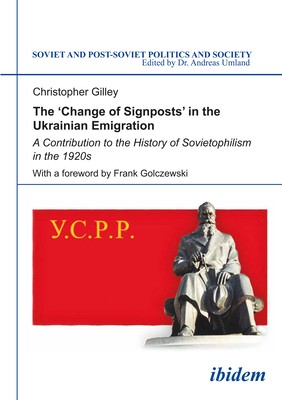
- We will send in 10–14 business days.
- Author: Christopher Gilley
- Publisher: Ibidem Press
- ISBN-10: 3898219658
- ISBN-13: 9783898219655
- Format: 14.8 x 21 x 2.4 cm, minkšti viršeliai
- Language: English
- SAVE -10% with code: EXTRA
The 'Change of Signposts' in the Ukrainian Emigration (e-book) (used book) | bookbook.eu
Reviews
Description
The failure of the attempts to create a Ukrainian state during the 1917-21 revolution created a large Ukrainian émigré community in Central Europe which, due to its experience of fighting the Bolsheviks, developed a decidedly anti-Communist ideology of integral nationalism. However, during the 1920s some in the Ukrainian emigration rejected this doctrine and began to advocate reconciliation with their former enemies and return to Soviet Ukraine. This included some of the most prominent figures in the Ukrainian governments set up after 1917, for example Mykhailo Hrushevskyi, Volodymyr Vynnychenko, and Yevhen Petrushevych. On the basis of published and unpublished writings of the Sovietophile émigrés, Christopher Gilley reconstructs and analyzes the arguments used to justify cooperation with the Bolsheviks. In particular, he contrasts those who supported the Soviet regime because they saw the Bolsheviks as leaders of the international revolution with those who stressed the apparent national achievements of the Soviet Ukrainian republic. In addition, Gilley examines Soviet policy towards pro-Soviet émigrés and the relationship between the émigrés and the Bolsheviks using documents from historical archives in Kyiv. The Ukrainian movement is compared to a similar phenomenon in the Russian emigration, "Smena vekh" ("Change of Signposts"). The book contributes to the study of the era of the New Economic Policy and Ukrainianization in the Soviet Union as well as to the histories of the Ukrainian emigration in the 1920s and of Ukrainian political thought.
EXTRA 10 % discount with code: EXTRA
The promotion ends in 22d.14:13:37
The discount code is valid when purchasing from 10 €. Discounts do not stack.
- Author: Christopher Gilley
- Publisher: Ibidem Press
- ISBN-10: 3898219658
- ISBN-13: 9783898219655
- Format: 14.8 x 21 x 2.4 cm, minkšti viršeliai
- Language: English English
The failure of the attempts to create a Ukrainian state during the 1917-21 revolution created a large Ukrainian émigré community in Central Europe which, due to its experience of fighting the Bolsheviks, developed a decidedly anti-Communist ideology of integral nationalism. However, during the 1920s some in the Ukrainian emigration rejected this doctrine and began to advocate reconciliation with their former enemies and return to Soviet Ukraine. This included some of the most prominent figures in the Ukrainian governments set up after 1917, for example Mykhailo Hrushevskyi, Volodymyr Vynnychenko, and Yevhen Petrushevych. On the basis of published and unpublished writings of the Sovietophile émigrés, Christopher Gilley reconstructs and analyzes the arguments used to justify cooperation with the Bolsheviks. In particular, he contrasts those who supported the Soviet regime because they saw the Bolsheviks as leaders of the international revolution with those who stressed the apparent national achievements of the Soviet Ukrainian republic. In addition, Gilley examines Soviet policy towards pro-Soviet émigrés and the relationship between the émigrés and the Bolsheviks using documents from historical archives in Kyiv. The Ukrainian movement is compared to a similar phenomenon in the Russian emigration, "Smena vekh" ("Change of Signposts"). The book contributes to the study of the era of the New Economic Policy and Ukrainianization in the Soviet Union as well as to the histories of the Ukrainian emigration in the 1920s and of Ukrainian political thought.


Reviews